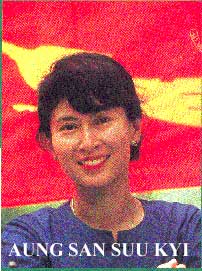Aung San Suu Kyi

Aung San Suu Kyi pronounced (Sue Chee)
Leader of Burma's struggle for democracy,
is one of the world's most prominent woman leaders. Courageously defying Burma's brutal military regime for over 12 years, Suu Kyi won the Sakharov Prize for Freedom of Thought in 1990 and the Nobel Peace Prize in 1991.
Popularly dubbed "Burma's Gandhi", Suu Kyi's struggle to rid Burma of military dictatorship through nonviolent resistance and dialogue has gained the support of
Nobel laureates and leaders around the world. Archbishop Desmond Tutu refers to Burma as the "Next South Africa".
Suu Kyi's political party, the National League for Democracy, won a landslide victory in a 1990s general election, gaining 82% of the seats in parliament. The military regime subsequently annulled the election results, placing hundreds of members of parliament and Suu Kyi under arrest. She was held under house arrest from 1989-1995.
Upon her release in July 1995 she stated "I am free. Nothing else has changed." Suu Kyi was still held under virtual house arrest, forbidden from traveling to meet her supporters or her party members.
Since September she has again been placed
under house arrest yet again.
The military regime launches repeated attacks against Suu Kyi and her family, calling on a group of thugs (known as the Union Solidarity and Development
Association and comparable to Hitler's "brownshirts") to assassinate her. The regime's transporation secretary
spoke to a crowd in early 1996: "Do you know what this means? It means we must kill her" (Letters to a Dictator, All Burma Students Democratic Front). The thugs
attacked her car with chains and rocks, ceasing when it became apparent that she was protected (Economist, September 1996).
The military regime also prevented Suu Kyi from seeing her husband before his death in March 1999. Upon falling ill in a London hospital, Aris attempted to obtain a travel visa to see his wife before his death. Despite pressure from Kofi Anan and several Asia governments, the military regime refused to allow him a travel visa into Burma, claiming that such activities were too political. Aris died before Suu Kyi was able to see him. In her final words on her husband's death, she stated "I feel so fortunate to have had such a wonderful husband who has always given me the understanding I needed; nothing can take
that away from me."
In 1997 in a speech smuggled out of the country, she called on the world: "The cause of liberty and justice find simpathetic responses in far reaches of the globe.
Thinking and feeling people everywhere, regardless of color or creed, understand the deeply-rooted human need for a meaningful existence... Those fortunate enough to live in societies where they are entitled to full political rights can reach out to help the less fortunate in other parts of our troubled planet.
Young women and young men setting forth to leave their mark on the world might wish to cast their eyes beyond their own frontiers to the shadowlands of lost rights...
Please use your liberty to promote ours."
For more information on Aung San Suu Kyi visit Free Burma Coalition
http://www.freeburmacoalition.org/
